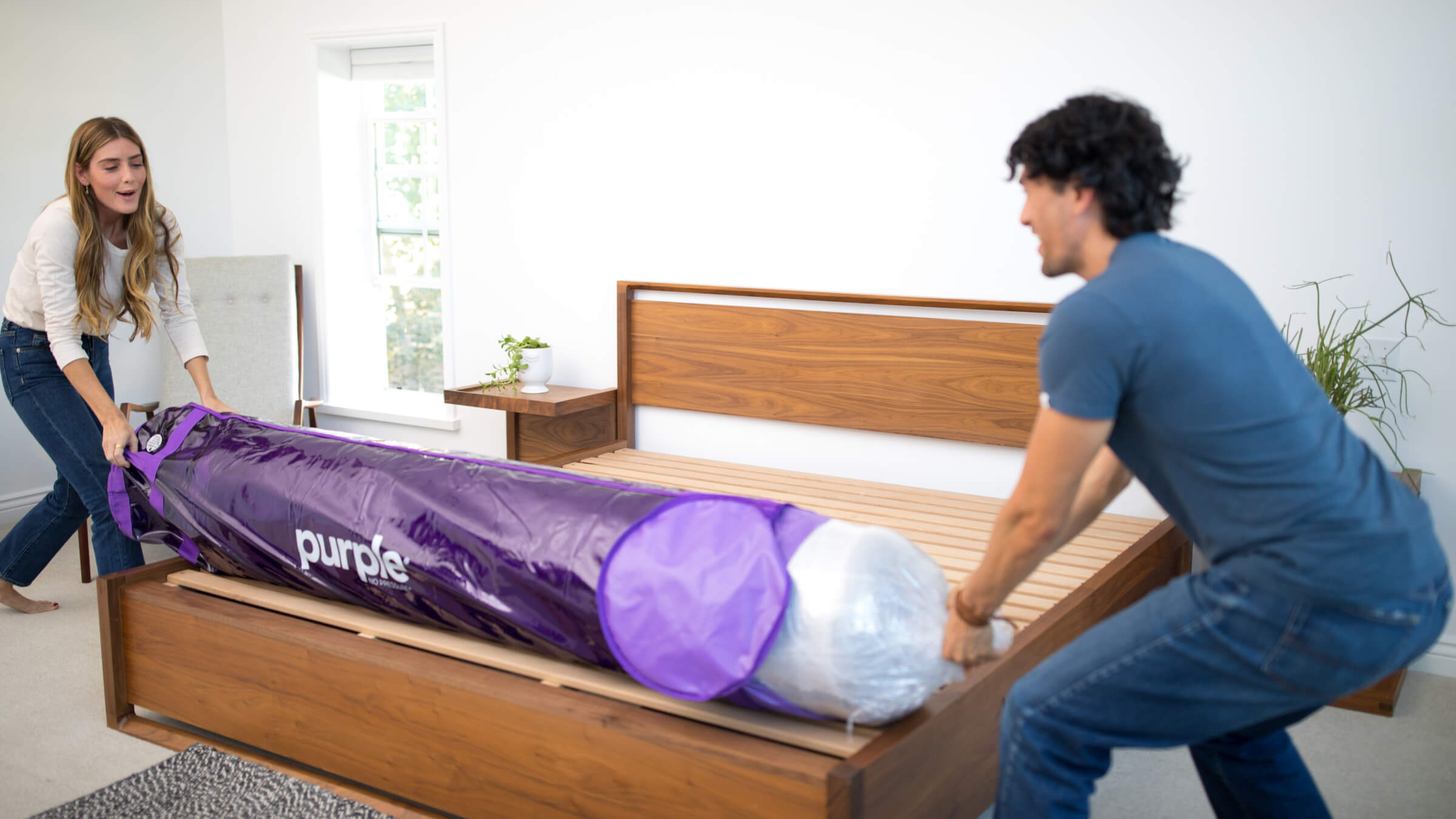Should you purchase a mattress online during Amazon Prime Day?
Online shopping is the new normal, but is it a good idea if you're buying a mattress in the Prime Day sales?

It’s not always possible to shop for a new mattress in person. In fact, traipsing from bed shop to shop can take up a lot of time, which is why many people choose to buy their mattress online. Whilst that's easy and convenient, are they any risks attached to it that you need to be aware? We take a look at the pros and cons right here.
All of the top recommendations in our guide to this year’s best mattresses are available to purchase online, showing just how much this sector has grown in the last five years alone. The big benefit of course is cheaper pricing – because these brands save on the cost of bricks and mortar stores, they can pass those savings on to you.
Now is a good time to buy too, as we're starting to see early October Prime Day mattress deals arrive from key brands including Linenspa and Zinus. For now, here are the pros and cons of purchasing a mattress online...
Today's top mattress deals
- Saatva mattresses: Save 15% on orders worth $1,000+
- DreamCloud mattress: Up to 50% off
- Nectar mattresses: Up to 40% off
- Helix mattresses: 25% off + free pillows
- Casper mattress: Up to 30% off
- Emma Sleep: 50% of all mattresses
- Brooklyn Bedding mattresses: 25% off sitewide
- Purple mattress: Save up to $600
Pros and cons of buying a mattress online this Prime Day
✅ There's more choice online
Shopping in person usually means visiting a few mattress stores in a day if they’re located near to each other. Even if those shops stock multiple brands, your choice is still going to be limited. This may encourage you to opt for a mattress that isn’t quite right simply because you're tired of shopping.
Every major mattress brand is now available to shop online, so you'll have plenty of choice available to you.

❌ You can't try before you buy
For us, this is the only major downside of online mattress shopping: you simply can't sit and lie on most of these beds without buying them first. That said, a lot of third party retailers, such as Dreams in the UK and Mattress Firm in the US, are stocking more popular boxed beds, so the tide may change on this in the near-future.
Sign up to get the BEST of Tom's Guide direct to your inbox.
Get instant access to breaking news, the hottest reviews, great deals and helpful tips.
✅ It's easier to compare models
Comparing mattress brands and models is essential to make sure you’re getting the right bed for you. To do this thoroughly, you can read online reviews, versus articles (direct comparisons), and compare customer reviews.
In person, your comparisons can only go as far as how each mattress feels in the moment, which could lead to you making the wrong decision.
❌ You can't negotiate the price...
Not all bricks and mortar stores will enter into price haggling, but some still do so if you want to try your luck at negotiating a cheaper price, you'll need to shop in store. Some will also throw in free bedding too, a tactic used by online sleep brands to sweeten the deal on a mattress purchase.
✅ ...but you usually get larger savings
We know from testing and researching the best mattresses in a box that they come with large savings and quite often free gifts. Brands like DreamCloud, for example, offer better value than traditional beds sold in retail stores because they save money on bricks and mortar stores and storage space. As expected, this trickles down to the customer, resulting in better deals online.
What to keep in mind when buying online
While buying a mattress online is generally risk-free, it's still easy to make mistakes. Here are three essential things you need to know before you shop:
1. Always shop from a reputable retailer

There are many websites that claim to have the cheapest mattresses, but that’s not always a good sign. To ensure you spend your money in the right place and make a good investment, you should always shop from a reputable retailer.
This may not necessarily mean shopping directly from the manufacturer of the website, retailers like Amazon and Mattress Firm have some great options, but it means ensuring the website you use is legit, well-reviewed, and has a good reputation.
2. Look for a warranty and sleep trial
All trusted sleep brands offer a decent mattress warranty and a sleep trial. The warranty will ensure that you’re covered for any repairs or replacements needed, and is often between anywhere from 10 years to a lifetime.
It takes 30 days for a mattress to soften and for your body to get used to a new sleeping surface, so a sleep trial should at the very least cover this. Ideally, you’ll get a minimum of 90 days to sleep on your new mattress and still qualify for a return, some brands even allow a full 365 days.
3. Put your sleep needs first
You need to know what you want from a mattress before shopping online. This includes the mattress size, the feel, materials used, and the build. These preferences will be determined by your sleep style and needs.
For example, if you’re a hot sleeper you’ll want to look for cooling materials that draw heat away from your body as well as this year’s best cooling mattresses. If you’re a back sleeper, you’ll want a medium to medium-firm mattress that helps align your spine. Spending time doing the research will be well worth it.
Shopping online vs in store
Buying a mattress online offers major perks compared to shopping in store. Chief among these is price, as online brands can sell their mattresses for much cheaper than you'd pay for comparable models in store.
While you won’t be able to lie down on the mattress like you might in a store, all of the mattresses we have tested and recommend in our guide to the best mattress to buy online come with a generous sleep trial.

These trials last anywhere from 90 nights to a whole year, with most brands offering free returns within that trial if you change your mind about the mattress. So there's little risk to you.
In fact, the majority of reputable mattress brands offer free shipping and returns, so you don’t even have to worry about scheduling or paying for your delivery or collection.

Lauren is an experienced writer and editor in the health and lifestyle industry and has led many campaigns and projects that deliver news, advice, and research on all things sleep. As the Sleep Features Editor for Tom’s Guide, Lauren writes, commissions and edits sleep and mattress content, from in-depth how-tos in sleep and mattress health to interviews with doctors and neuroscientists on the latest news in sleep. Lauren regularly tests new sleep tech and accessories to evaluate their effectiveness for getting good quality sleep and easing specific sleep struggles like nighttime anxiety. Alongside this, Lauren reports on the best mattress brands out there, like Helix, Saatva, and DreamCloud, helping readers find the right mattress for them and the best deals on them.
